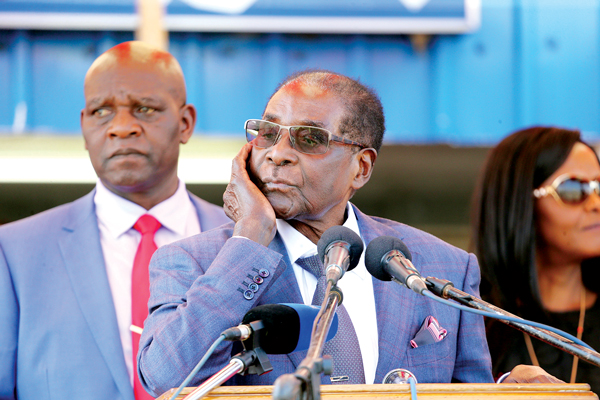
CORRUPT officials in former President Robert Mugabe’s government reportedly stalled a multi-billion-dollar investment for over six years, frustrating the country’s economic revival programmes, President Emmerson Mnangagwa claimed yesterday.
BY RICHARD CHIDZA
Mnangagwa told top government officials who included Vice-President Kembo Mohadi and Cypriot magnet and Karo Holdings proprietor Loucus Pouroulis that he took the billionaire investor to Mugabe in 2013, but the deal was inexplicably stalled.
“I am happy that this day has come. It has taken us more than six years to get to this day. Had we embraced their intention to invest in this country in platinum the year they came and I took them to the President, we should have been in the sixth-year of their investment.
“But because of bureaucracy and other vested corrupt interests, this did not happen. Now it has happened, we have given them concessions, I have seen the timelines,” Mnangagwa said.
Mugabe, a few years ago, admitted that some of his Cabinet ministers were demanding millions of dollars in bribes from potential investors. Mnangagwa yesterday vowed that he would not tolerate any bureaucratic delays or corruption.
“The ball is no longer in our court but your court. In fact, at one time they raised money and it was taken away because the Zimbabwean side did not move. Now we are saying Zimbabwe is open for business and whoever stands in the way will fall.
“Wherever Zimbabwe has an obligation, Zimbabwe must meet that. If you have any problems, come to me my door, it’s open. Tell me if my ministers are dragging their feet, I will cut them or make sure they move,” Mnangagwa said.
- Chamisa under fire over US$120K donation
- Mavhunga puts DeMbare into Chibuku quarterfinals
- Pension funds bet on Cabora Bassa oilfields
- Councils defy govt fire tender directive
Keep Reading
Pouroulis paid tribute to Mnangagwa for assisting him get the necessary paperwork and get through the country’s bureaucracy. He said his investment will bump Zimbabwe’s Gross Domestic Product (GDP) by some 20%.
“This will be world-class Platinum Group of Minerals (PGM) mining venture complete with its own coal mine and power station, the surplus of which as the minister has said will be fed into the national grid. We believe we can achieve all the timeframes within the five years.
“When all this is finished, potentially it will grow the GDP of Zimbabwe by at least 20%. It means this will take the country into an incredible trajectory path. We have been in Zimbabwe for quite a few years,” said Pouroulis.
Speaking at the signing ceremony for the mega deal, Mines and Mining Development minister Winston Chitando said the face of mining in Zimbabwe would never be the same again.
“The agreement provides for the installation of capacity to produce 14,4 million tonnes of ore and 1.4 million PGM ounces. Firstly commissioning of the first portal by 2020 to produce 3.6 million tonnes and 350 000 PGM ounces per annum,” he said.
He added that the second to fourth portals will come on stream annually up to 2023 to produce similar quantities until the investment comes to fruition.
“Based on current production capacities this will make Karo Holdings the largest producer of PGM by 2023. Karo will also construct a precious and base metal refineries by 2024. There are also plans to work with other producers of base metals to cooperate with Karo Holdings. To augment power supply, Karo Holdings will establish an electricity plant by 2024 in Matabeleland North which will be fed by a coal operation in the same province,” said Chitando.
The investment would be worth $4,2 billion, employing 15 000 people and an estimated 75 000 will get jobs “indirectly”, according to Chitando











